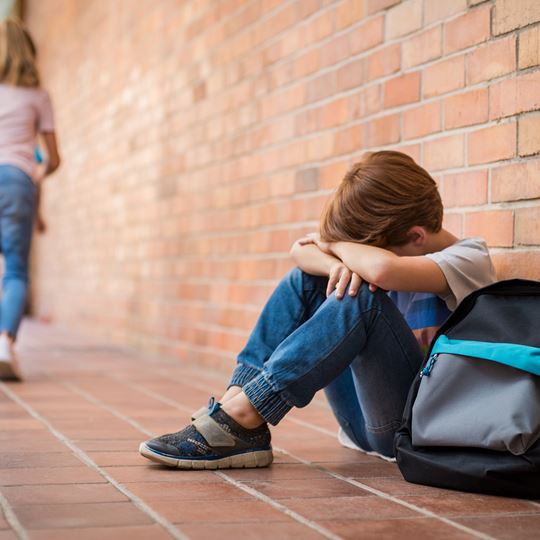While adults go through things like work stress, relationship problems, and financial issues, children will have challenges of their own. Some of the most serious challenges children face are bullying and cyberbullying.
What is bullying and cyberbullying?
In simple terms, bullying is when a person shows cruel behaviour to another person (usually from child to child). It is usually repetitive and often involves belittling the victim. Cyberbullying is much the same, except it takes place online. One example of cyberbullying is a child posting an image of their victim with a cruel caption. This post may get shared on social media, making the victim feel humiliated and distraught.
Any form of bullying should be dealt with as soon as possible. If it isn’t, the bullying may worsen and cause serious emotional issues in the victim. For children in care, bullying can be even more of an issue and cause emotional distress on top of any potential trauma they have already experienced.
As a foster parent, you should learn how to spot the signs of bullying and know how to help your foster child handle it properly, especially if you are considering fostering a teenager. Read on to learn how.

Spot the signs
Children don’t always go to their parents or guardians about bullying. That might be for several reasons, including feeling embarrassed or not feeling comfortable enough with their guardian. Due to children often keeping it to themselves, as a parent, you must spot the signs of bullying, which include:
- Acting reserved and anxious
- A change in habits
- Not eating or sleeping properly
- Avoiding school or other places with young people
If you notice a distinct change in behaviour and a desire to stay away from school/clubs, your child may be getting bullied, and it’s time to take action. A conversation with your child might be enough to find out what is happening, but you might also need to speak with school teachers.
Monitor social media use
These days, a lot of bullying occurs online, and that’s what cyberbullying is. Even if your child is doing fine in school, they may still be getting bullied online, and this can make them feel sad and alone.
To prevent your child from getting cyberbullied, you must monitor their social media use. Don’t let them browse sites or talk to people online without you knowing about it. Children often don’t know the dangers of the internet, and you can ensure that they stay safe from the threats there.
Let them know that you’re on their side
Sometimes children assume that even their parents won’t be on their side. So, if they open up to you about the bullying they’re experiencing, remember to reassure them that you are one hundred percent on their side and that you’ll do whatever you can to help them. That reassurance can make a real difference to their confidence.
Provide advice
If you know your child is getting bullied in person or online, you should share your wisdom about how to deal with it. Your child might not know how to deal with them, after all. Some good pieces of advice include:
- Act confident
- Say ‘no’ or ‘leave me alone’ in a loud voice
- Tell a teacher
Alongside advice, be sure to reassure them and do as much as you can to boost their self esteem and make them feel valued.
Speak with the school
If your child is getting bullied at school, talk to someone at the school as soon as possible. It can be hard to face the battle from home without knowing exactly what is going on, after all. You could speak with your child’s teachers or even get in touch with the headteacher. Hopefully, they will help you deal with the bullies. They may speak with the bullies themselves or contact their parents.

Use the right labels
A lot of children don’t realise they are getting bullied. Often, they will get told that they are over-reacting and that it is simply teasing. It might even come from ‘friends’. If your child is upset about people being cruel to them, label the term for what it is – bullying – and help them deal with it.
The truth is, many bullies don’t realise they’re bullying, either, and bringing the real label into it may open their eyes.
Block cyberbullies
If you discover bullies on your child’s social media accounts, show them how to block people. Don’t do this without their consent, as you may lose their trust. Instead, teach them sensible ways to use these online platforms and how to prevent people from getting in contact with them online. It is better to educate them on these matters so they can take action themselves.
Build their confidence
While building your child’s confidence doesn’t directly deal with the bullying, it can help your child brush the mean comments off, which may make the bullies grow bored. Find something that your child is good at, whether that’s painting, running, or climbing, and let them pursue that hobby. Not only will it build their confidence, but they may also grow a group of friends with similar interests.
Seek outside help
Many organisations help deal with bullying, so you can contact them for advice. At Fosterplus, there is a whole network of support around that you can turn to, and if you’re a foster parent you can speak directly with your social worker who will be able to offer guidance. Talking to your foster child’s dedicated social worker is also important, especially if you are providing emergency foster care and will not be with the child for very long. If you spot the signs of bullying, let the social worker know so that the child has someone to help them once they leave your care.
Listen
Sometimes, the best thing you can do as a parent, or foster parent, is listen to your child. If your child comes to you about bullying, let them speak and listen intently to everything they say. Just listening can be enough at first – you can take action after. Let them know that you are a team and that everything you do to help them will be with their knowledge.
Bullying is an awful thing for anyone to go through. If you find out your child is getting bullied, you will most likely feel hurt and angry. Remember that there are sensible ways to deal with it; the above advice will help protect your child and ensure they don’t go through it alone.
If you are interested in caring for a child or young person, find out more about becoming a foster parent with Fosterplus.
You may also find interesting…
Can’t find what you’re looking for?
By Phone
One of our team is available to talk to you over the phone to answer any of your fostering queries.
By Email
You can get in touch by filling out our online enquiry form with any queries that you may have.
Visit an office
Find contact details for your local office team. We’re always happy for you to pop-in and chat.





